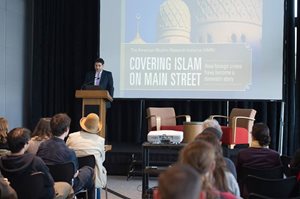American Muslim Research Institute (AMRI)
Founded in 2014 by Professor Karam Dana at the University of Washington Bothell, the American Muslims Research Institute (AMRI) is a pioneering academic center focused on the study of American Muslims. As one of the few U.S.-based institutions dedicated to this field, AMRI bridges scholarly research and community outreach, producing data-driven, intersectional scholarship on American Muslims’ experiences, racialization, and contributions to U.S. society.
AMRI’s research situates American Muslims within broader frameworks of race, religion, and ethnicity, addressing their complex identities and relationships with other marginalized communities. By examining issues such as Islamophobia, racial justice, and political activism, AMRI challenges stereotypes and fosters a more nuanced understanding of American Muslims’ racialized identities, emphasizing the diversity of the community. And situating these experiences within the larger socio-political landscape of US society.
A core principle of AMRI is engaged scholarship, aligned with UW Bothell’s commitment to community-based research. In addition to generating cutting-edge academic work, AMRI actively disseminates knowledge through public lectures, panel discussions, and community events. These initiatives promote conversations, enhance civic engagement, and build partnerships with policymakers, educators, activists, and the public.
Since its founding, AMRI has hosted more than 20 high-profile events. Annual public lectures feature leading scholars, public figures, and community leaders, offering UW Bothell students and faculty direct access to some of the most recognized names in the field. These events, which address critical issues such as civil rights, Islamophobia, and antiracist activism, have drawn diverse audiences from across sectors, including government, nonprofit organizations, and the arts.
AMRI’s success lies in its collaborative, interdisciplinary approach, working with a network of academics around the US and fostering partnerships with community organizations.
Through its focus on scholarly inquiry and community engagement, AMRI has played a vital role in institutional building at UW Bothell, promoting critical thinking, cultural awareness, and social responsibility. As an intellectual hub for the study of American Muslims, AMRI continues to drive forward a deeper understanding of this community and contribute to a more inclusive, informed society.

Contact us:
Project Director and Principal Investigator
Karam Dana, Ph.D.
Alyson McGregor Distinguished Professor of Excellence & Transformative Research
School of Interdisciplinary Arts & Sciences
University of Washington Bothell
karam@uw.edu
